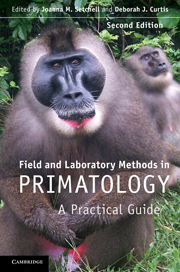Book contents
- Frontmatter
- Contents
- List of contributors
- Foreword by Robert D. Martin
- Introduction
- 1 An ethnoprimatological approach to interactions between human and non-human primates
- 2 Habituating primates: processes, techniques, variables and ethics
- 3 Habitat description and phenology
- 4 Geographical information systems and remote sensing
- 5 Monitoring local weather and climate
- 6 Survey and census methods: population distribution and density
- 7 Trapping primates
- 8 Handling, anaesthesia, health evaluation and biological sampling
- 9 Morphology, morphometrics and taxonomy
- 10 Marking and radio-tracking primates
- 11 Field experiments with non-human primates: a tutorial
- 12 Feeding ecology, frugivory and seed dispersal
- 13 Dietary analysis I: food physics
- 14 Dietary analysis II: food chemistry
- 15 Collecting arthropods and arthropod remains for primate studies
- 16 Recording primate vocalizations
- 17 Photography and video for field researchers
- 18 Chronobiological aspects of primate research
- 19 Thermoregulation and energetics
- 20 Field endocrinology: monitoring hormonal changes in free-ranging primates
- 21 Collection, storage and analysis of non-invasive genetic material in primate biology
- 22 Tips from the bush: an A–Z of suggestions for successful fieldwork
- Index
- References
20 - Field endocrinology: monitoring hormonal changes in free-ranging primates
Published online by Cambridge University Press: 05 June 2012
- Frontmatter
- Contents
- List of contributors
- Foreword by Robert D. Martin
- Introduction
- 1 An ethnoprimatological approach to interactions between human and non-human primates
- 2 Habituating primates: processes, techniques, variables and ethics
- 3 Habitat description and phenology
- 4 Geographical information systems and remote sensing
- 5 Monitoring local weather and climate
- 6 Survey and census methods: population distribution and density
- 7 Trapping primates
- 8 Handling, anaesthesia, health evaluation and biological sampling
- 9 Morphology, morphometrics and taxonomy
- 10 Marking and radio-tracking primates
- 11 Field experiments with non-human primates: a tutorial
- 12 Feeding ecology, frugivory and seed dispersal
- 13 Dietary analysis I: food physics
- 14 Dietary analysis II: food chemistry
- 15 Collecting arthropods and arthropod remains for primate studies
- 16 Recording primate vocalizations
- 17 Photography and video for field researchers
- 18 Chronobiological aspects of primate research
- 19 Thermoregulation and energetics
- 20 Field endocrinology: monitoring hormonal changes in free-ranging primates
- 21 Collection, storage and analysis of non-invasive genetic material in primate biology
- 22 Tips from the bush: an A–Z of suggestions for successful fieldwork
- Index
- References
Summary
INTRODUCTION
Field endocrinology can be considered as the application of non-invasive methodologies to examine behavioural–endocrine interactions in primates living in natural conditions and social settings. In bringing together laboratory and field-based research methods, the discipline provides new and exciting opportunities for developing a more integrated approach to studies of primate behavioural ecology.
Traditionally, field studies have relied mainly on visual measures, such as behaviour and/or morphology. Although this has generated a great deal of essential information, its limitation is that interpretation of the observations is often based on assumptions concerning the physiological context in which they were made. The availability of non-invasive methodologies based on measurement of hormones in either urine or faeces now provides us with quantitative measures of physiological status by which the significance of observational data can be gauged. This greatly facilitates the testing of hypotheses concerning the adaptive significance of behavioural and morphological traits and mating systems and is helping to provide new insights into reproductive processes in an evolutionary context. Field endocrinology also facilitates a better understanding of the impact of anthropogenic activities on primate physiology. In combination with studies of the health status of wild primates (Chapter 8), this can help to elucidate the link between environmental stress, health and reproductive parameters and thus to estimate the viability of threatened populations (Pride, 2005; Chapman et al., 2007).
Information
- Type
- Chapter
- Information
- Field and Laboratory Methods in PrimatologyA Practical Guide, pp. 353 - 370Publisher: Cambridge University PressPrint publication year: 2011
References
Accessibility standard: Unknown
Why this information is here
This section outlines the accessibility features of this content - including support for screen readers, full keyboard navigation and high-contrast display options. This may not be relevant for you.Accessibility Information
- 25
- Cited by
